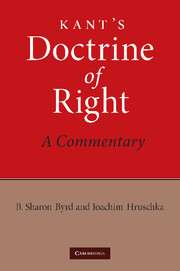Description
Kant's Doctrine of Right
A Commentary
Authors: Byrd B. Sharon, Hruschka Joachim
This commentary explains the Doctrine of Right, analyzing Kant's terminology, method and ideas in the light of his intellectual environment.
Language: English
Subject for Kant's Doctrine of Right:
Approximative price 49.66 €
In Print (Delivery period: 14 days).
Add to cart
Kant's Doctrine of Right
Publication date: 08-2012
Support: Print on demand
Publication date: 08-2012
Support: Print on demand
Approximative price 114.03 €
In Print (Delivery period: 14 days).
Add to cart
Kant's doctrine of right : a commentary
Publication date: 03-2010
346 p. · 16x23.4 cm · Hardback
Publication date: 03-2010
346 p. · 16x23.4 cm · Hardback
Description
/li>Contents
/li>
Published in 1797, the Doctrine of Right is Kant's most significant contribution to legal and political philosophy. As the first part of the Metaphysics of Morals, it deals with the legal rights which persons have or can acquire, and aims at providing the grounding for lasting international peace through the idea of the juridical state (Rechtsstaat). This commentary analyzes Kant's system of individual rights, starting from the original innate right to external freedom, and ending with the right to own property and to have contractual and family claims. Clear and to the point, it guides readers through the most difficult passages of the Doctrine, explaining Kant's terminology, method and ideas in the light of his intellectual environment. One of the very few commentaries on the Doctrine of Right available in English, this book will be essential for anyone with a strong interest in Kant's moral and political philosophy.
Introduction and methods of interpretation; 1. The idea of the juridical state and the postulate of public law; 2. The state of nature and the three leges; Appendix. Iustitia tutatrix, iustitia commutativa, and iustitia distributiva and their differences; 3. The right to freedom; 4. The permissive law in the Doctrine of Right; 5. The external mine and thine; 6. Intelligible possession of land; 7. The 'state in the idea'; 8. The state in reality; 9. International and cosmopolitan law; 10. The 'idea of public law' and its limits; 11. Contract law I. Why must I keep my promise?; 12. Contract law II. Kant's table of contracts; 13. Criminal punishment; 14. The human being as a person; Appendix I. On the logic of 'ought' implies 'can'; Appendix II. The system of rules of imputation; Bibliography; Index.
© 2024 LAVOISIER S.A.S.
These books may interest you

Kant: The Metaphysics of Morals 32.87 €

Kant: The Metaphysics of Morals 77.67 €


